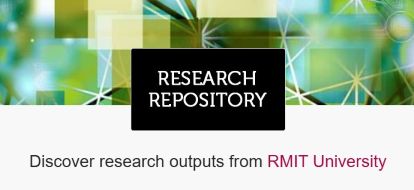About the Research Repository
The Research Repository is RMIT University's open access publications and data repository and uses the Figshare platform. RMIT researchers can use the Research Repository to share and promote research data and other research output types to the global community.
Image: Copyright © Figshare. Used under licence.
The Research Repository provides:
- a free and safe environment to share, promote and make research data available open access
- a Digital Object Identifier (DOI), which is automatically allocated to records created using the Dataset item type.
Benefits of the Research Repository:
- Researchers can create rich metadata to aid in discoverability, provide funding details, and choose their own license for use and reuse of their work.
- Researchers can edit and update records as their research evolves, and load data in numerous forms (e.g. spreadsheets, raw code, large audio and video files).
- Publications accompanied by published data attract 25% more citations, increasing your impact and engagement.
- Meets funder and journal requirements to publish your research data.
Figshare's State of Open Data 2024 report outlines the current open data landscape.
"Figshare logo" by Team Figshare is licensed under CC BY-NC-ND 4.0
Accessing and using the Research Repository
-
Access the Research RepositoryLog in using your RMIT login and password.
-
Research Repository home pageAccess the Research Repository and find further information.
-
How to use the Research RepositoryFAQs and instructions are available from the Research Repository home page on how to add and manage your publications.
-
Library Shorts: Using FigshareA short video on how to use RMIT's Figshare (Note: RMIT log in is required)
RMIT researcher experience of Figshare
Watch the video below to learn about how RMIT researcher, Dr. Andrew Martin uses Figshare to store, promote, and share his research data.
RMIT Research Data Champion: Dr Andrew Martin (10:13 mins) by RMIT Library Teaching & Research (YouTube)
Research Repository FAQs
What item types can I load and share via the Research Repository?
There are 26 item types available, and these are listed below.
- Book chapter
- Composition
- Conference contribution
- Data Management Plan
- Dataset
- Educational resource
- Event
- Figure
- Funding
- Journal contribution
- Media
- Model
- Monograph
- Online resource
- Peer review
- Performance
- Physical object
- Poster
- Pre-print
- Presentation
- Registration
- Report
- Service
- Software
- Standard
- Workflow



